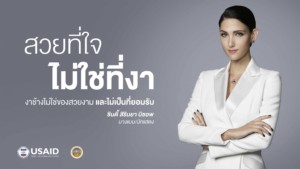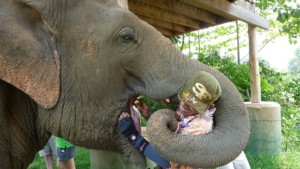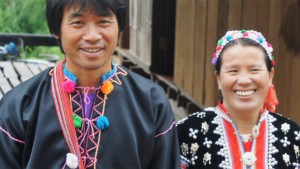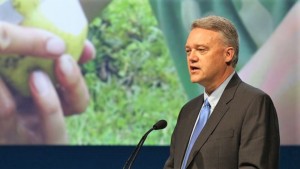Most elephant tourism activities are “not bad” in moderation: Experts
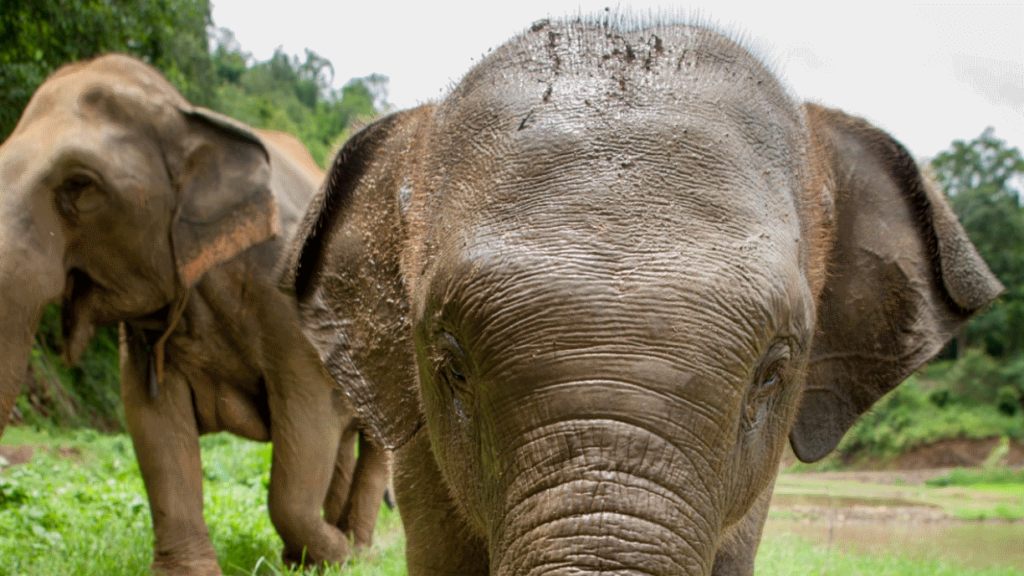
If there was a definitive point to come out of the session on elephant tourism at the 2019 Global Sustainable Tourism Council (GSTC) Asia-Pacific Sustainable Tourism Conference today in Chiang Mai, it would be that there are no definitive points. Exactly what constitutes appropriate, pragmatic standards for elephant welfare is yet to be determined.
Given the lack of clarity and consensus around the issues, the best and fairest takeaway from the session would be that any typical tourism activity involving elephants is fine — in moderation — and that many of the stressors on captive elephants are due to overwork and/or the conditions they inhabit when they are not working — including the working conditions of mahouts.
Session moderator John Roberts, Group Director of Sustainability at Minor Hotels Group and an elephant expert in his own right, started the discussion with the simple and honest statement that he was confused.
There are 3,783 elephants in captivity in Thailand, he said, and the vast majority of them are earning their keep from tourism. Meanwhile there continue to be elephants working on rubber plantations in the Kingdom’s south.
Mr Roberts explained that for some 4,500 years, humans have kept elephants in captivity. The reasons? For war and logging and other things no-one or nothing else could do. Tourism has given them and their mahouts alternative employment now that those traditional jobs have dried up.
Not all of Thailand’s 3,783 captive elephants can go back into the wild. There is just not enough wilderness. And rural communities would then have to contend with them.
It is only comparatively recently that the world has changed, along with attitudes. But mahouts don’t really think it has changed, he said.
It was only about five years ago that people started to say that riding elephants was bad. On the face of it that’s preposterous, he exclaimed. Elephants are large; humans are small. But he noted that there are bad training practices, bad riding practices, and there are bad mahouts.
And anyway, no-one really knows what’s good or bad for elephants. They, the elephants, can’t tell us.
So, is tourism good for elephants?
Five experts, including three PhDs, joined Mr Roberts on the stage to discuss issues around elephant welfare:
- Dr Jan Schmidt-Burbach, Global Wildlife and Veterinary Advisor, World Animal Protection
- Dr Pakkanut Bansiddhi, Researcher, Center of Excellence in Elephant Research and Education, Chiang Mai University
- Dr Chatchote Thitaram, Director, Center of Excellence in Elephant Research and Education, Chiang Mai University
- Nia Klatte, Sustainability Coordinator, Exo Travel
- Daniel Turner, Director, Animondial
Elephant riding “not bad”
Dr Pakkanut described her world-first studies of the physical and physiological stress levels of elephants in tourism-oriented venues in Thailand. She noted that stress hormones did indeed increase during high tourist seasons. However, she also opined that many of the tourism activities in which elephants are typically involved are not the primary stressor. Any work, including riding, is “not bad” in moderation, she said, so long as it takes into account the workload, stress, and welfare of each individual elephant. In the meantime, there is a lot more research to be done.
Mahout mythbuster
Dr Schmidt-Burbach, a vet with a PhD in elephant health and welfare, said that in 2015 among 150 tourism-oriented venues in Thailand, 80% provided “severely inadequate conditions”, 13% “improved”, but still inadequate conditions, and 7% “good” captivity conditions. Northern camps were generally better than southern camps, he said.
Part of the problem were the mahouts, he said, due to their low salaries, poor working conditions, and high risk of injuries. Busting a myth that the profession was inter-generational, passed down from father to daughter, mother to son, Dr Schmidt-Burbach asserted that three quarters of Thai mahouts have worked in other fields and more than 50% of them have come from families that never owned an elephant. Furthermore, only 12% would want their child to do the same work.
![Most elephant tourism activities are "not bad" in moderation: Experts 3 A mahout with young elephant. By Alexander Klink [CC BY 3.0 (http://creativecommons.org/licenses/by/3.0)], via Wikimedia Commons](https://goodtourismblog.com/wp-content/uploads/2017/06/1024px-Mahout_with_young_elephant-1024x683.jpg)
Dr Schmidt-Burbach also pointed out that there are 30% more elephants in captivity since the 1992 logging ban and less than 50% of those are former logging elephants. Tourism is the primary driver in the growth of captive elephant numbers.
Noting a shifting demand toward “elephant-friendly” attractions, meaning observation-only activities and demonstrable welfare-oriented management practices, Dr Schmidt-Burbach would add to that wishlist captive environments that enable a full range of natural behaviours and better working conditions for mahouts. Tourists are increasingly prepared to spend more on elephant-friendly alternatives, he said.
It’s about the practical, not the ethical
Daniel Turner, an animal welfare specialist, was keen to point out that this was not an ethical discussion; rather a means of identifying practical solutions that are both safe for tourists and elephants. Charged with drafting and compiling consistent elephant welfare standards, Mr Turner said the problem with standards is that many organisations produce them and that leads to confusion. “We need alignment,” he said.
Complicating matters for Mr Turner was his recent experience over the three days leading up to the conference during which he visited Thai elephant camps for the first time. He discovered that the reality on the ground and differences in activities and programs in various camps makes it even harder to translate principles into standards.
Mr Turner fully agreed that mahouts are often left out of the equation and that there would be better outcomes for elephants if their keepers were valued more.
Elephant A&E
Dr Chatchote discussed the role of mobile elephant clinics and the few elephant hospitals distributed around the Kingdom of Thailand. These facilities provide not only health care and preventive medicine to elephants, but also offer education & training to staff at elephant camps, respond to abuse complaints, and identify causes of suspicious death.
Dr Chatchote agreed that riding was okay in moderation.
Not only about elephants
Ms Klatte described Exo Travel’s philosophy which included a proactive engagement with suppliers. Exo, she said, takes a holistic approach. They are concerned not just with the welfare of elephants, but also the environmental and social impacts of the elephant camps.
Featured image: Tackling valid concerns around elephant tourism head-on. Source: ACEWG.


